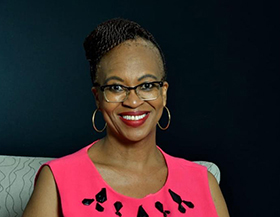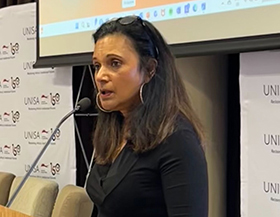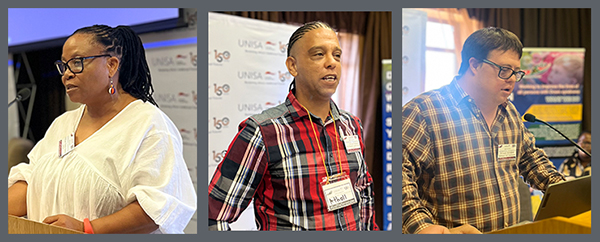College of Education
Breaking down systematic barriers for people living with down syndrome
The Unisa Centre of Excellence in Disabilities and Down Syndrome South Africa recently hosted the World Down Syndrome Day Symposium, observed on 21 March as declared by the World Health Organisation (WHO). The first symposium, hosted under the theme "Dismantling stereotypes – uniting voices for change", aims to bring together key industry players, including researchers, educators, the healthcare workforce, civil society groups, parents and people living with down syndrome (DS) to show solidarity for those living with down syndrome and other intellectual disabilities, but, most importantly, provide a platform where individuals can share daily experiences and testimonies of navigating life while living with a disability.

Prof Mpine Makoe
Aligned and symbolic with the celebration of Human Rights Day, Prof Mpine Makoe, Executive Dean of the College of Education, said the university will continue to provide quality inclusive education for all persons, including those with disabilities. "As achieved by the institution over the past 150 years, Unisa continues to provide education that does not exclude nor leaves anyone behind, irrespective of any circumstance," said Makoe. She added that it is vital that we dismantle stereotypes as they are inaccurate and promote misinformation, further leading to unfair treatment, underestimation and exclusion from employment opportunities.
National Executive Director of Down Syndrome South Africa, Ancella Ramjos, said it is a societal duty of all citizens to raise awareness and to correct the myths about DS as they limit the contribution and potential to accomplish extraordinary tasks by people living with DS. The Executive Director for Unisa's Centre Excellence in Disabilities, Prof Nareadi Phasha, said collaboration with external stakeholders is necessary to forge a powerful collective voice that will fight for change. She added: "The journey towards empowerment and inclusivity is not a solitary one but one that requires the involvement of organisations dedicated to persons with disabilities. Moreover, collaboration is a fundamental principle that underpins the collective effort to create a world where everyone, regardless of ability, can thrive."

Ancella Ramjos
Phasha said the collaboration reaffirms the commitment of the Centre of Excellence in Disabilities' dedication to driving transformation and inclusivity, further stating that the partnership will amplify voices and create impact. She said the symposium's success will inspire meaningful system change and advocate for policy reform that ensures equal opportunities.
Atoll Kleinhans, from the Sefako Makgatho Health Sciences University's Department of Public Health: Health Systems Strengthening and Policy, delivered the World Health Organization's Global report on health equity for persons with disabilities, which details the challenges faced by persons living with disabilities and the dire consequences they face. The report revealed that people living with disabilities have minimal access to healthcare, experience extreme judgement and ill-treatment from healthcare professionals, and incur higher health costs, thus creating restrictions that lead to the premature death of persons living with disabilities or developing comorbidities that are unrelated to their disability, further citing that socioeconomic factors exacerbate these challenges.
Recommendations in the report include developing inclusive health policies, providing comprehensive healthcare, ensuring universal access to assistive products and investing in research, amongst others. The WHO report suggests that health equities for persons living with disabilities can only be achieved through specialised primary healthcare that integrates targeted disability-inclusive actions. Regarding inclusive education, Kleinhans stressed the importance of continuing advocacy for inclusive education and refraining from endorsing a separate education system for people with disabilities as it further creates systematic barriers.

Prof Nareadi Phasha, Atoll Kleinhans and Luan Swanepoel
Self-advocate who is living with DS, Luan Swanepoel, said it was vital for him to take up the task of educating people about DS to dispel misconceptions and ignorant practices: "Medical professionals see me as someone who needs fixing, while society classifies me as someone who cannot learn and contribute to society." Another self-advocate, Tenjiwe Ndebele, spoke on visible and invisible disabilities, saying society needs more awareness of invisible disabilities, such as intellectual disabilities, as people living with invisible disabilities are disregarded.
* By Dineo Khayemba, Journalist, Unisa Radio
Publish date: 2024/04/11

 Unisa co-hosts G20 community outreach in the Eastern Cape
Unisa co-hosts G20 community outreach in the Eastern Cape
 Unisans gain membership of prestigious science academies
Unisans gain membership of prestigious science academies
 Advocating for disability transformation through servant leadership
Advocating for disability transformation through servant leadership
 Unisa Press continues to illuminate the publishing space
Unisa Press continues to illuminate the publishing space